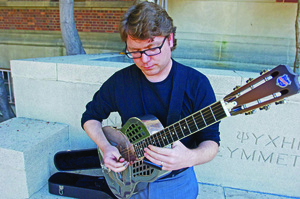Music school makes a ‘popular’ transition

School of rock · (above) Associate Dean Christopher Sampson oversees the school’s new pop music program.
Popular music has endured numerous reincarnations since it first solidified itself as a genre in the 1950s.
In the 1960s, it was engulfed by the British Invasion. The 1980s saw the rise of made-on-MTV solo artists like Michael Jackson and Madonna, a trend that remained strong in the 2000s with the help of teenyboppers and the widespread appeal of “American Idol.”
In the next decade, it could very well be the students you see dragging guitars, basses and even a “rock” violin around campus.
This coming fall, popular music is once again undergoing a reincarnation as USC’s Thornton School of Music unveils its bachelor of music degree in popular music performance. But rather than reformatting the genre, Thornton is returning to popular music’s roots.
“We’re taking an extremely open definition of popular music: For us, it’s any style or genre that has the song as its principal repertoire,” said Christopher Sampson, associate dean of the division of popular music and industry studies. “It’s intended to be a very, very broad umbrella that encompasses a lot of different styles.”
Instead of cultivating the next glittered pop star or charismatic band donning pudding-bowl haircuts — images many associate with the term “pop music” — Sampson assures that the major, which was five years in the making, will explore the breadth of the relatively young genre’s already extensive library.
“Rock, R&B, gospel, blues, Latin … Each one has their own language, performance technique and nuances,” Sampson said. “If somebody’s going to be successful in performing or writing in the popular music world, they’re going to need to understand those traditions and subtleties.”

(left) A student practices in the Roland Drum Lab, which was installed on campus last spring. - Photos Courtesy of the Thornton School of Music
Yet there’s one long-standing tradition Sampson and the rest of the faculty at Thornton are ignoring — that music performance majors must choose between a strictly classical or jazz curriculum and nothing else — a tradition that Sampson admitted was fitting for some burgeoning musicians yet stifling for others.
“We saw students were wanting to draw outside of the lines of the standard performance offerings [of classical and jazz],” Sampson said. “They were understanding that they need to diversify their skills as well as recognizing that their influences were crossing all kinds of genres.”
This meant Thornton had to draw outside of the lines as well. The launch of Thornton’s popular music performance major is not only a landmark event at USC, but also on the national stage, for this innovative program is the first of its kind at a major university (many universities hold courses in the study of popular music, but none have a major in the actual performance of the genre).
While being the leading model for the rest of the nation’s music schools sounds like a rather daunting task, Sampson claims that the decision to incorporate the program seemed only natural, given USC’s home in Los Angeles.
“Because of our location in LA, there’s a rationale behind offering this program,” Sampson explained. “It’s entirely intended to reflect the changing music industry.”
Not only has Los Angeles been consistently at the forefront of prominent music scenes, the city is also the current hub for music recording, making Los Angeles the prime location for any aspiring musician, songwriter, manager, promoter or recording engineer.
As those two very different aspects of music have long coexisted in Los Angeles, a large part of the program focuses on the integration of the popular music performance majors with those majoring in music industry — a key distinction between the popular music and classical and jazz majors.
“The music business and technology are extremely important to the popular music world,” Sampson explained. “Our music industry students are going to work directly with these new performance students to basically form a miniature music network, which is the type of thing they would experience in the real world.”
The program’s incoming class of 28 students is comprised of 22 freshmen and six transfers, all with various concentrations such as drums, vocals, songwriting and of course, that “rock” violin. To further heighten that sense of the “real world,” the program’s core class organizes this diverse community of popular musicians into small bands, where they learn how to create arrangements, rehearse as a group and enhance their performance technique by playing before audiences.
Another unique aspect of the major utilizes the newly instated Roland Drum Lab, which was opened during the Spring 2009 semester through Thornton’s partnership with the Rowland Corporation, a leading manufacturer of electronic instruments. As part of their training, each popular music major will take a course to become drum set proficient, regardless of his or her concentration.
“The concept of time awareness and groove is critical to feel the beat along with your colleagues,” Sampson explained. “There’s no better way to learn this but by actually feeling it and playing the drums.”
The only question that remains, then, is why would an aspiring rock musician spend the money on this degree program when popular musicians are notorious for finding their musical footing outside of classroom walls and on the streets with other like-minded, musically inclined friends?
“This program isn’t intended to replace the learn it on the streets mentality — it was meant to reflect a changing music marketplace,” Sampson said. “For a special type of rock or pop musician who wants to diversify their skill sets and go about this in an extremely smart and thoughtful way, this program is an appropriate fit.”
